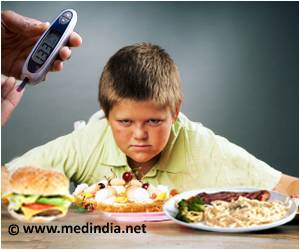Screen time with smartphones and tablets can also increase the risk of obesity as much as watching television.

- Screen time with smartphones and tablets increases the risk of obesity as much as watching television.
- Engaging in use of these hand-held devices increases consumption of sugary beverages, causes lack of sleep and decreases physical activity.
- Adolescents who spent more time on these devices were 43% more likely to suffer from obesity.
On an average American children watch television for 2 to 3 hours in a day. Having a television set in kid's bedroom is not unusual for an average American household and this makes it easy for them to have ready access to it.
Television viewing causes obesity by mechanisms like lack of physical activity, increase in fast food consumption, increased calorific diet while watching T.V and reduced metabolism.
Survey
Researchers from the Harvard T.H. Chan School of Public Health, Dr. Erica L. Kenney and Dr. Steven L. Gortmaker, studied data from the 2013 and 2015 waves of the Youth Risk Behavior Surveillance System.
The survey gathered data on the following:
- Hours spent on screen devices including smartphones, tablets, computers, and videogames and television.
- Hours of sleep on an average school night.
- Number of sugar-sweetened beverages consumed in the previous 7 days.
- Frequency of physical activity (at least 60 minutes per day) for the past 7 days.
Obesity and poor diet were the effects of watching excess television among adolescents.
Adolescents who spent more than 5 hours a day on screen devices were twice as likely to drink a sugary drink each day and not get enough sleep or physical activity. Their chances of having obesity was 43% more than those who did not spend time on these devices.
What Can be Done
According to Dr. Kenney, "This study would suggest that limiting children's and adolescents' engagement with other screen devices may be as important for health as limiting television time."
Clinicians are encouraging families to set limits for both television and other screen devices.
This study is not a conclusive evidence but the finding that using screen devices results in higher rates of obesity, is cause for concern.
The new study is published in The Journal of Pediatrics.
References
- Television Viewing - A Major Cause of Obesity Among US Children - (https://www.medindia.net/news/healthwatch/television-viewing-a-major-cause-of-obesity-among-us-children-82903-1.htm)
- Erica L.Kenney et al. United States Adolescents' Television, Computer, Videogame, Smartphone, and Tablet Use: Associations with Sugary Drinks, Sleep, Physical Activity, and Obesity.The Journal of Pediatrics; (2016) DOI: http://dx.doi.org/10.1016/j.jpeds.2016.11.015
Source-Medindia















